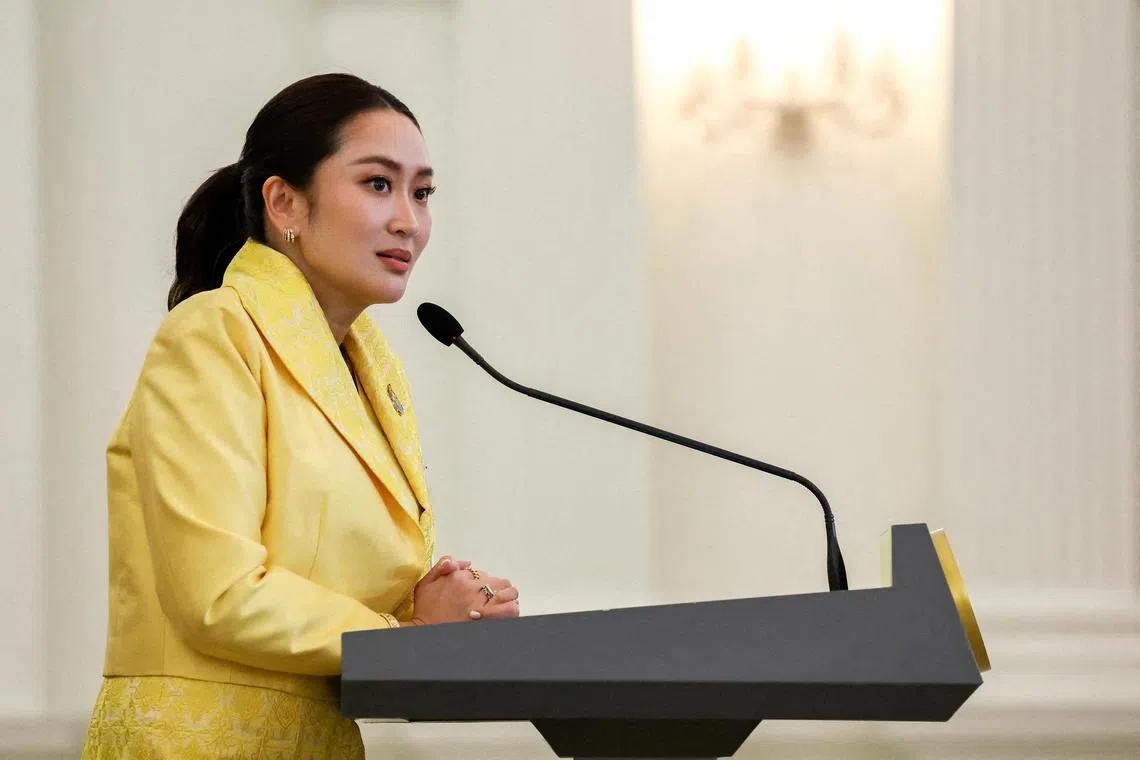Thai ruling party grapples with border crisis, thorny court case amid bleak economy
Sign up now: Get ST's newsletters delivered to your inbox

This week's proceedings could add to mounting troubles for Prime Minister Paetongtarn Shinawatra and her Pheu Thai Party.
PHOTO: REUTERS
Follow topic:
BANGKOK – Thailand’s ruling party, besieged by a faltering economy and a border crisis, faces more uncertainty this week as the Supreme Court begins hearing a case that could lead to jail time for its most influential politician, Mr Thaksin Shinawatra.
The billionaire former premier, and the driving force behind the government of his daughter Paetongtarn Shinawatra, skipped prison on his return in 2023 from 15 years of self-exile
But this week’s proceedings could add to mounting troubles for political newcomer Paetongtarn and her Pheu Thai Party, if the court deems the hospital detention unlawful and orders Mr Thaksin to serve his original prison time.
“There is already a crisis of confidence for the Prime Minister,” said Dr Wanwichit Boonprong, a political science lecturer at Rangsit University.
“Many people feel the government cannot handle all the crises the country is facing.”
An escalation in a border row with Cambodia
Critics will scrutinise the government’s handling of critical talks with its neighbour set for June 14, amid growing public unease over its management of an economy shackled by crippling household debt.
A negative outcome in Mr Thaksin’s case and the border dispute would ratchet up the pressure on Pheu Thai, say analysts, both in the ruling coalition and among the public, as protest simmers.
But veteran Pheu Thai politician Somkid Chuekong dismissed any potential political impact from Mr Thaksin’s case, emphasising that he has no direct say in government affairs.
“He has only expressed his thoughts and suggestions on the government’s work,” said Mr Somkid, who is Ms Paetongtarn’s deputy secretary-general.
Mr Thaksin could not immediately be reached for comment.
His case and the government's handling of various challenges have chipped away at public confidence, said Mr Rangsiman Rome, a lawmaker of the opposition People's Party.
“It will be very difficult to govern in the short term because the people no longer have any confidence left.”
VIP treatment
Mr Thaksin appeared to be in good health as he met cheering crowds on his return home in 2023, before appearing in court to be sentenced to eight years in jail for abuse of power and conflicts of interest.
The 75-year-old spent just a few hours in jail before complaining of chest and heart problems
A royal pardon
On June 12, the Medical Council of Thailand will decide if three doctors who signed off on Mr Thaksin’s hospital stay should be punished for abusing their authority.
That decision will feed into a Supreme Court process that starts on June 13 concerning the legality of the hospital detention. It is unclear when it will yield a verdict.
Despite not holding any formal position, Mr Thaksin has cast a long shadow over the government, through meetings with foreign leaders, campaigning in local elections and weighing in on policy.
Sixty per cent of respondents in a poll last week believed Mr Thaksin’s case would affect the stability of a government whose popularity was shaken after it paused a cash handout programme to tens of millions of Thais.
“He has a lot of influence on this government, and it would hurt public confidence if the outcome of the case is negative,” said Associate Professor Yuttaporn Issarachai, a political science expert at Sukhothai Thammathirat Open University.
Border tension
The Pheu Thai administration is also struggling to prevent the border dispute with Cambodia from spiralling out of control, as both sides have mobilised troops before talks between their militaries curbed rising tension set off by a recent skirmish.
The June 14 talks with Cambodia may not lead to a resolution, however, said Dr Titipol Phakdeewanich, a political science specialist at Ubon Ratchathani University.
“The Prime Minister has not been very firm in her statements, which raised questions by some about whether this government is actually protecting the interests of the country,” Dr Titipol said.
The border row has become a lightning rod for administration critics, with royalists holding small protests and urging the military to oust the government, as it has at least 10 times since 1932.
“The country now faces security issues, and nationalism is on the rise at a time when government leadership is at its weakest,” said Mr Jatuporn Prompan, a Mr Thaksin ally turned critic.
“Some people have started calling for a coup.”
But Defence Minister Phumtham Wechayachai last week talked down such a possibility.
“The army has to do its duty,” he told reporters. “There is no conflict with the government.” REUTERS

